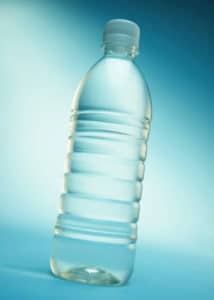The Trouble with Bottled Water
 Over the weekend, a friend shared with me how a local university banned bottled water on their campus. On one hand, I knew the reason behind this change, and celebrated it. Plastic water bottles have become an enormous source of trash, with three out of four bottles going into landfills or incinerators rather than being recycled. It also takes an equally enormous amount of resources to manufacture the bottles, and then market and transport the finished product around the globe.
Over the weekend, a friend shared with me how a local university banned bottled water on their campus. On one hand, I knew the reason behind this change, and celebrated it. Plastic water bottles have become an enormous source of trash, with three out of four bottles going into landfills or incinerators rather than being recycled. It also takes an equally enormous amount of resources to manufacture the bottles, and then market and transport the finished product around the globe.
I started drinking bottled water in the 90’s, when I quit drinking the diet soft drinks that I finally conceded were not healthy. (This is a story in itself – how I got caught up drinking free refills of Diet Pepsi with my fast-food lunch, usually consuming 48 oz. or more during each midday ritual.) But then I began to believe the growing evidence that drinking tap water has its own safety concerns. I knew several people who were selling water filtration kits to attach to your kitchen sink to filter out all of the impurities, and they showed me evidence that that water company would not want to publicize. So our regular trips to the grocery store included cases of whatever brand of bottled water was on sale, trusting that this had to be better than what came out of our (or someone else’s) pipes.
At some point, it occurred to me that we were spending a lot of money on bottled water. It bothered me a bit that what should be free was costing a relatively ridiculous amount of money, especially when I bought single bottles from a machine. We could probably afford a new refrigerator with a built-in filter for all we were paying for the bottled water. So in 2002, we bought a new fridge, and now both my water AND ice were pure! Now, never mind that a new filter costs as much as six cases of water – they never explained that at the time of purchase. But now we could reuse any plastic water bottles that we bought.
Then I discovered some of the evils of plastic. One co-worker explained to me that the tiny crevasses in the plastic bottles were breeding grounds for bacteria, and that I shouldn’t reuse my plastic bottles. I also learned that many brands of bottled water come from public water supplies, not exotic mountain streams or springs. While that water may be filtered, the new plastic bottles were actually leaching toxic chemicals into the “pure” water I was drinking. Is anything safe???
Well, I quit buying bottled water except when trapped in places like the airport (and that’s when I really have to pay a premium!) For a short while I switched to resealable glass bottles – until one broke. Then I started drinking out of my Nalgene water bottles that I’d previously reserved for backpacking, until I found out that they too leach chemicals into the contents. I heard metal bottles were better, but then discovered that aluminum is not good – they are lined with plastic. We finally found some reasonably priced stainless steel bottles, which are now considered the best option. What a long and winding road!
And yet, it brings me back to the beginning of the story. While I saw the benefit of banning bottled water on the campus, I was still troubled. People are finally making the healthy choice to drink water rather than the soft drinks laden with high-fructose corn syrup. But the machines on campus no longer carried bottled water – only bottled soda! This didn’t seem right. If you’re going to ban bottled water, shouldn’t you ban all bottled drinks?
I started to imagine everyone carrying their own bottle or cup, and either getting free water or paying for fountain drinks. The logistics seemed tough to deal with – first, you could no longer have self-serve machines available when or where it’s impractical to have an attended soda fountain. And how would you price a drink when there are no standard container sizes? Small, medium or large, at the discretion of the cashier? How well would that work???
I feel somewhat defeated, that the soda drinkers of the world continue to have their convenience, and are able to mindlessly dispose of their plastic bottles any way they choose. Of course, that’s why some states and even a few progressive cities tacked on a bottle charge to discourage littering and encourage returning the bottles for credit. They did that in Columbia, MO, and after the initial rebellion, people eventually accepted it. And some people were able to make a small living collecting the rich kids’ trash. I just don’t expect that the university could implement on campus what Columbia did on a city-wide basis.
Any ideas?
For more information on the facts behind bottled water, go to www.StoryOfBottledWater.org.

It is up to all of us to make a difference. Everyone has to be responsible for their own waste. There are so many options that are available to us if we just look around. What is needed more than anything is a commitment to bettering our lives in a way that truly supports the planet.
I have actually been looking at “packaging” lately and am implementing changes in the way that I buy things. I am appalled by the amount of trash we create in general. It is not enough to recycle we must reduce and reuse. Thanks for your loving commitment to a better world.